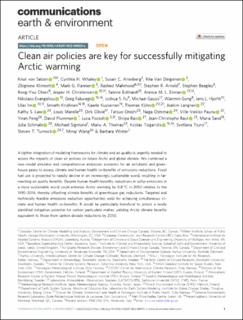Clean air policies are key for successfully mitigating Arctic warming
von Salzen, Knut; Whaley, Cynthia; Anenberg, Susan C.; Van Dingenen, Rita; Klimont, Zbigniew; Flanner, Mark G.; Mahmood, Rashed; Arnold, Stephen R.; Beagley, Stephen; Chien, Rong-You; Christensen, Jesper H.; Eckhardt, Sabine; Ekman, Annica M. L.; Evangeliou, Nikolaos; Faluvegi, Greg; Fu, Joshua S.; Gauss, Michael
Peer reviewed, Journal article
Published version
Permanent lenke
https://hdl.handle.net/11250/3025242Utgivelsesdato
2022Metadata
Vis full innførselSamlinger
- Publikasjoner fra Cristin - NILU [1360]
- Vitenskapelige publikasjoner [1096]
Sammendrag
A tighter integration of modeling frameworks for climate and air quality is urgently needed to assess the impacts of clean air policies on future Arctic and global climate. We combined a new model emulator and comprehensive emissions scenarios for air pollutants and greenhouse gases to assess climate and human health co-benefits of emissions reductions. Fossil fuel use is projected to rapidly decline in an increasingly sustainable world, resulting in far-reaching air quality benefits. Despite human health benefits, reductions in sulfur emissions in a more sustainable world could enhance Arctic warming by 0.8 °C in 2050 relative to the 1995–2014, thereby offsetting climate benefits of greenhouse gas reductions. Targeted and technically feasible emissions reduction opportunities exist for achieving simultaneous climate and human health co-benefits. It would be particularly beneficial to unlock a newly identified mitigation potential for carbon particulate matter, yielding Arctic climate benefits equivalent to those from carbon dioxide reductions by 2050.

